At the start of September I decided to becoming a living cliche – I quit my reasonably well paid job in first world problems Scotland to come to the developing country of Georgia and earn buttons teaching English for a year. I have been here for just over two weeks now and what a couple of weeks it has been. After living in China for a year, I kind of thought that nothing could phase me. Cultural shock? Pfft, sounds like a myth to me. And having travelled round a lot of the former USSR this past year I honestly thought I was well prepared to come here but these first couple of weeks have quite the learning curve.
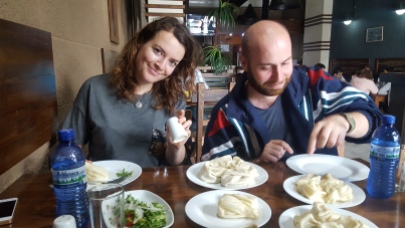
My programme started with an eight day orientation in Tbilisi. It was a little underwhelming and frustrating – we were trapped in a hotel (of all things, a frikkin’ Chinese built hotel that was almost a replica of the hotel I lived in in China – but that’s a different story) on the outskirts of the city. We had a minuscule amount of free time to explore Tbilisi and to experience first hand the country that we were hearing so much about in our orientation meetings. Couple that with intense nerves over the fact that none of us knew where in the country we were going to be placed or who we would be staying with for the next year and it was not the khinkali (Georgian dumplings) and wine filled Soviet dream I had been after!
After a nerve wracking few days I found out I would be living in a small former-Soviet spa resort town called Tskaltubo just outside of Kutaisi, Georgia’s second biggest city. I am living here with a single 30 year old girl, which is some what of an anomaly in the country. Generally speaking women are married by their late 20s and their is a lot of pressure to do so and if they aren’t married then they will normally still live at home. Tskaltubo itself is gorgeous. It is centred round a large park filled with public art and tree-lined boulevards. Kutaisi is about 20 minutes away by bus which allows me to still enjoy city life and to have great transport links for exploring the rest of the country.
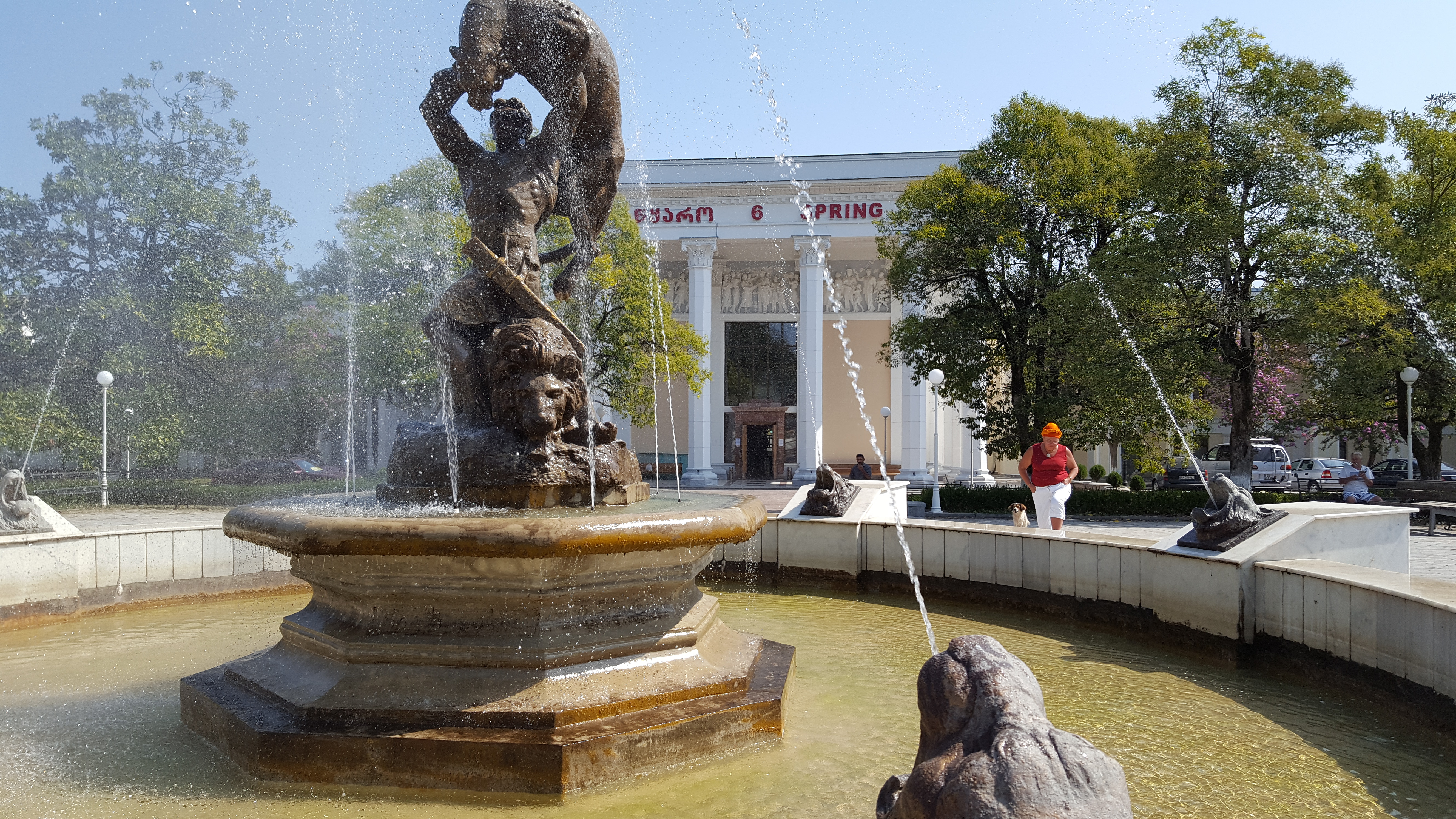
After arriving in Tskaltubo last week, a wave of unseasonably hot weather hit with temperatures reaching 37 degrees Celsius and uber high humidity. Needless to say, this pasty white Scottish girl was not enjoying herself and after finishing school would quickly run home to hide in her air-conditioned living room. Between the heat and all the new-ness I was just generally exhausted by the end of each day. This week temperatures finally dropped but I was struck down by a nasty cold virus that kept me off work for three days and so once again I was a hostage to the living room.
However, all these hurdles – being held captive in a compound, sweltering heat and illness – have not stopped me experiencing a lot in the short time that I have been here. Here are some of my initial impressions of the country thus far!
The People
Before coming here the praises of Georgian people and their hospitality were consistently sung to me. I was told that, for a Georgian, having a foreigner in their town/home/village/family/whatever was considered a blessing from God. As such I would be showered with food and wine, to the point that I was full to bursting. And about that they have not been wrong. Five of us left Tbilisi together to be taken to our host families. It felt like we stopped at every house on the way for a full blown meal. Okay that’s a slight exaggeration, but the host families did love to feed people who were complete strangers and whom they were never going to see again. Last weekend at my host’s extended family, the mother in law practically force fed me home-grown hazlenuts and I left with a whole plastic bag of them, along with a bag of grapes and a litre of homemade wine.
Besides from their infamous hospitality overall I can say that so far Georgians have
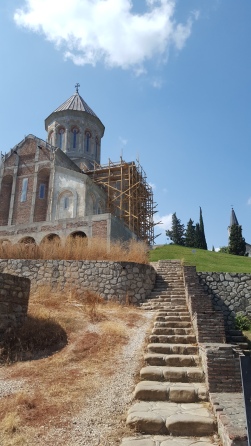
proven to have a great sense of humour. They seem to like cracking jokes and are often laughing. They can be, how shall we say, a little on the disorganised side and things often tend to happen or to change here with little notice. Resources tend to be poor and people rely on each other for information e.g. directions and transport times and routes. When we took an excursion to the Kakheti region, our bus driver stopped in the local village to ask for directions to the monastery we were visiting and I am yet to see a bus timetable posted anywhere. Frankly I am shocked the buses even have numbers on them.
I am still super unclear about some of the social norms here, especially as a female. Georgia is very famous for still being a patriarchal society with conservative views on things such as sex and marriage. It’s hard to get a direct answer about what is acceptable as a foreigner and what is not. Certainly in China the same behaviour was not expected of foreigners as it was of locals so I am interested to try and understand that dynamic. Oh, and everyone assumes you’re Russian if you’re foreign.
The Food (and Wine)
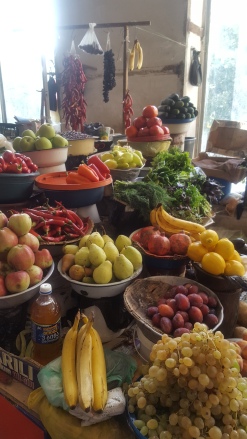
Perhaps even more talked about that its people was Georgia’s food (and admittedly that was about 99.9% of the reason I chose to come here). Save for their cheese – think feta on steroids in terms of its saltiness – I am certainly yet to be disappointed by anything that I have been served. The dishes themselves are generally pretty simple – stews, filled breads and salads – but what really hits home is the quality of the ingredients. Produce is so fresh and tasty. At home I would have to drown cucumber and tomato in a dressing or hide them in something else to make them really enjoyable but I can quite happily eat a tomato as if it was an apple and not feel that I was being deprived of any flavour here.
Almost everyone either grows their own produce or knows someone who knows someone that grows whatever it is they are after and will they get it from them. Even in my host home – which is hardly a traditional Georgian family – the honey and wine have all been made by some in-law relation and random home grown produce will inexplicably appear from time to time.
Of course, even better than the food is the wine (which makes up the other 0.01% reason I came here). Bottled stuff sold in supermarkets is pretty good. In a lot of markets though you will find homemade wine (along with brandy and the potent firewater that is chacha) being sold in reused plastic bottles and this is without a doubt the best stuff.
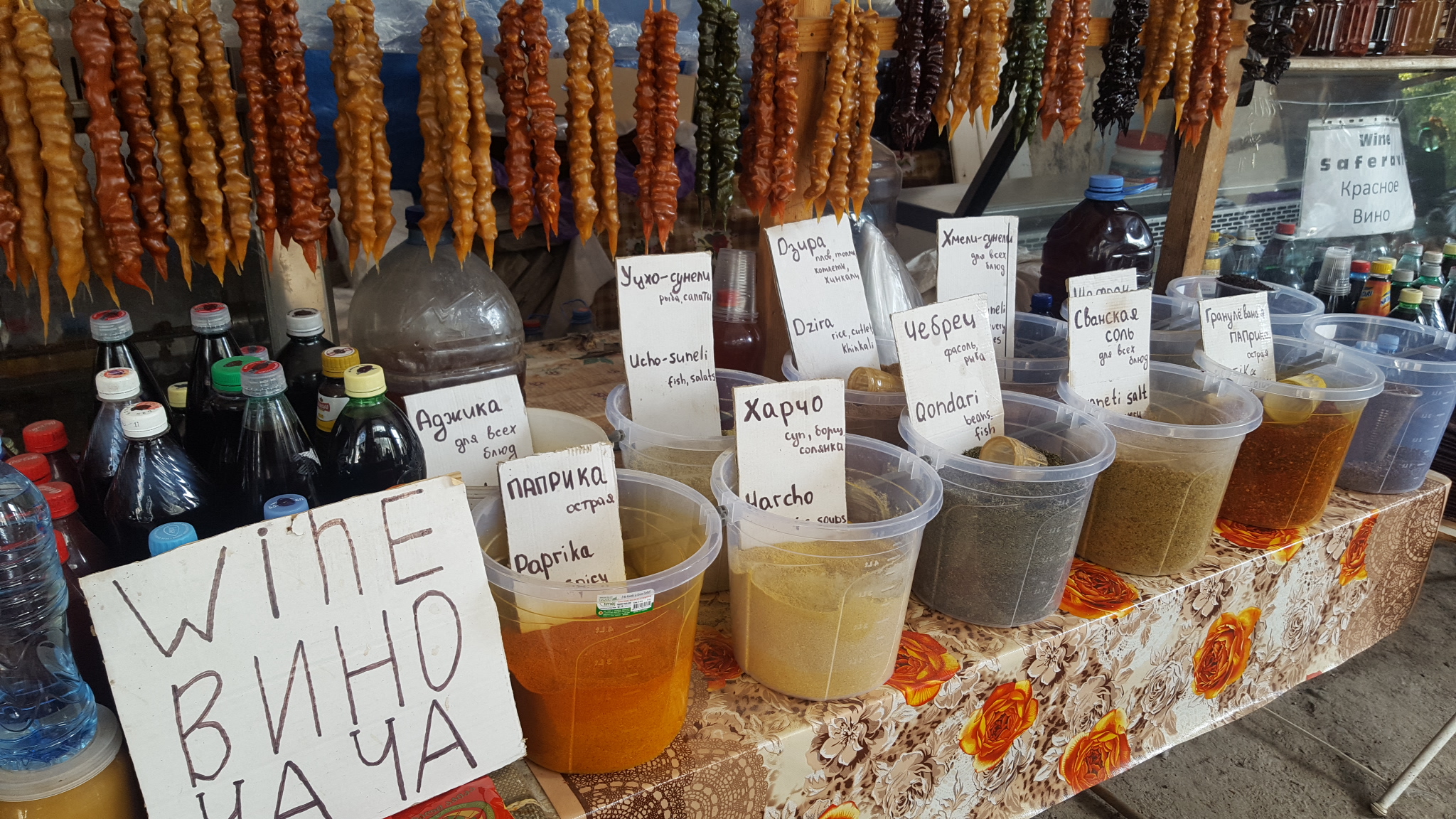
Oh, and did I mention that everything is dirt cheap? Four of us gorged ourselves on khinkali the other weekend for the grand sum of £7….
The Sights
I can already tell that I am going to be as fed up of Georgian churches as I was of Spanish
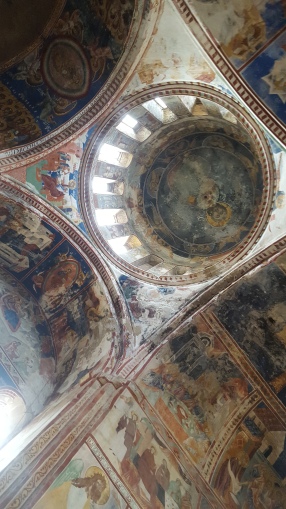
cathedrals after my time living there but that doesn’t stop them being pretty impressive and distinctive for the time being. My sightseeing has been pretty minimal but last week I did go to the Gelati Monastery, just outside of Kutaisi. Gelati could compete with the Sistine chapel – it boasts a beautiful hand painted ceiling showing images of Christ and other people from the Bible. The fact that the paint has been left to peel and deteriorate gives it somewhat more character than its Roman cousin. Even better you are saved from the mobs of tourists.
My favourite thing so far has without a doubt been the several markets that I have visited (I have been told Tskaltubo has one but am still looking for it!). Kutaisi’s, where we witnessed a gypsy child being reprimanded for stealing a dress in broad daylight is huge. Kutaisi itself is a great little city. It sits on the Rioni River and is fairly peaceful and quiet. I am yet to see a high rise building and have even seen cows walking the streets of the city. I am looking forward to exploring some more.
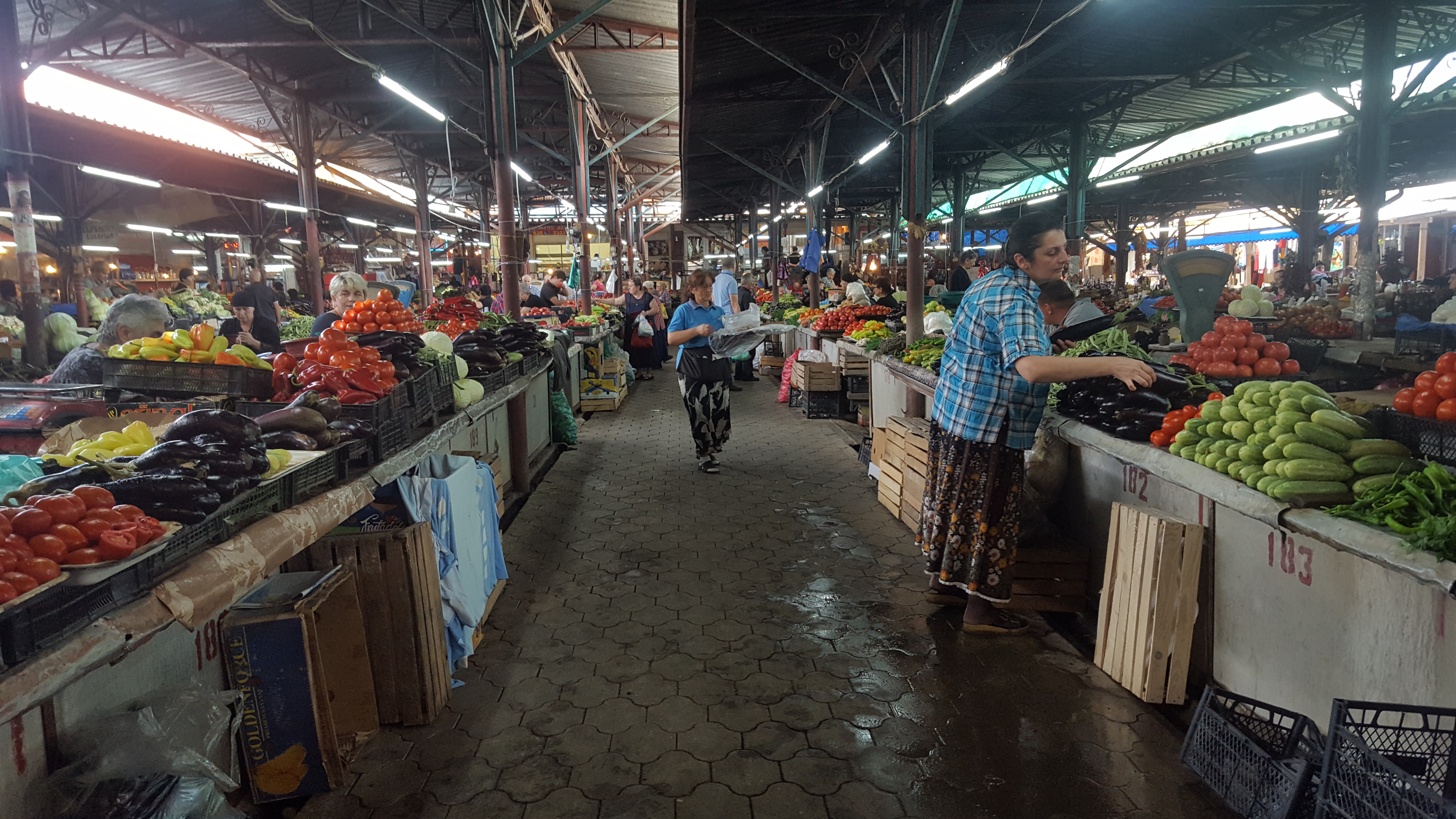
Around Tskaltubo is tempting mountain scenery. From what I’ve experience, outside of the hubs of Tbilisi, Kutaisi and Batumi, save the odd industrial town most of Georgia is pretty rural and remote. Even in a medium sized town such as mine there is plenty of nature around. Next weekend we are off to explore Borjomi National Park.
I am off for an impromptu weekend in Tbilisi today and am really looking forward to seeing the capital in the daylight. Most of our exploration was at night-time but from what I saw it does look like an amazing city. A eclectic mix of Turkish/Iranian/Mediterranean architecture overlooked by the distinct Mother Georgia and the city’s fortress. It’s a pretty busy city with heavy traffic and I have to admit that I am somewhat glad to be nearer Kutaisi because of this. If nothing else I can at least hopefully get the pizza I have been craving!
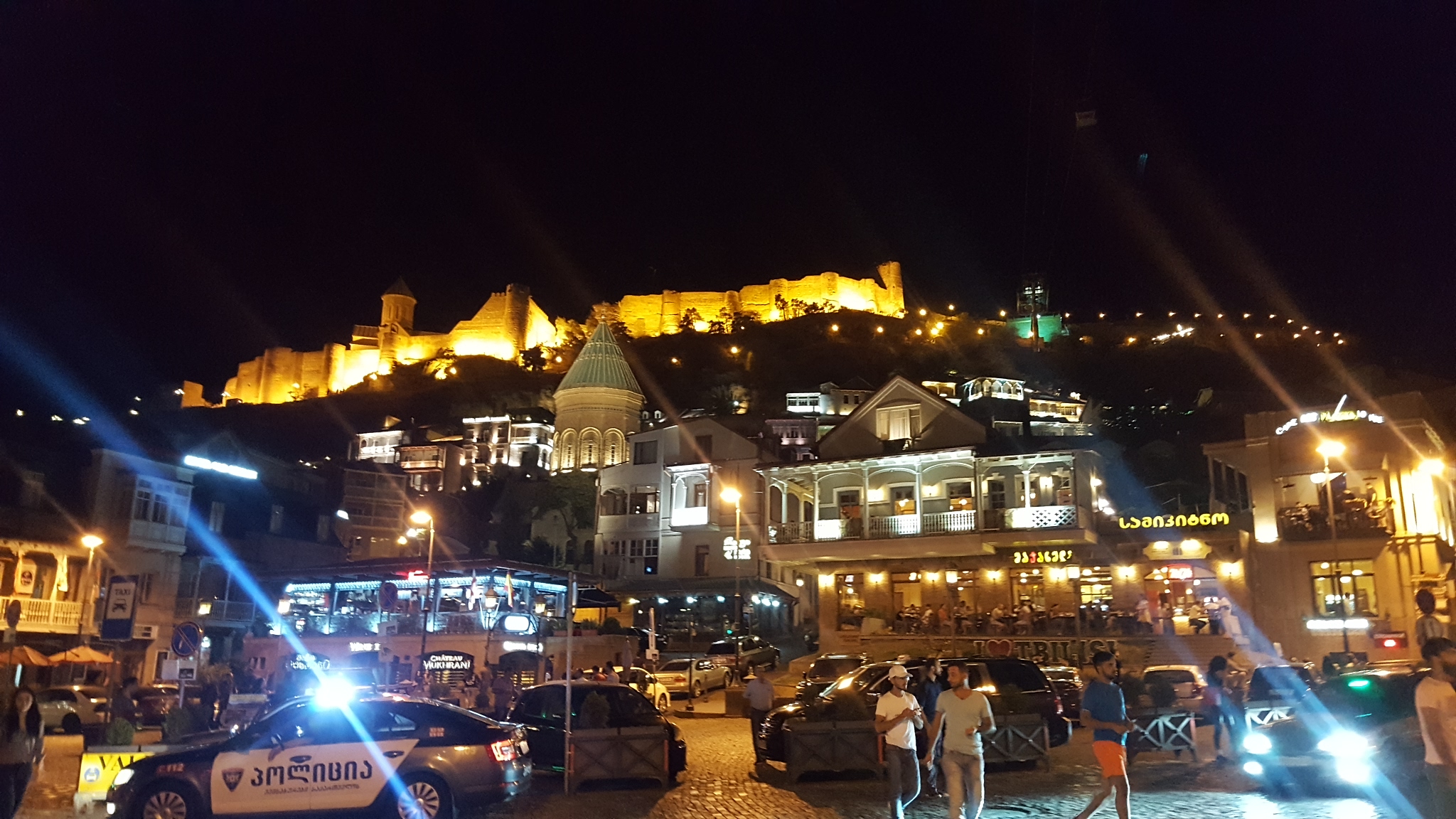
I’ve barely even scratched the surface of all the weird shit that has happened since being here – think cows grazing in your front garden and drinking brandy with the headmaster of your school at 9:00am. Nor have I spoken about the school or teaching itself – which has undoubtedly been the biggest culture shock but I shall save all that for another post.
As I said, it’s been a whirlwind couple of weeks and this past week’s illness hasn’t helped. At some points I have wanted to run away home (or at least to a country where I can speak the language!) but I am beginning to settle in now. As I said, the experience of culture shock has been a shock in itself but talking to other people in the programme, almost all of whom have lived abroad at some point, we are all going through the same thing.
Not being able to speak the language has definitely been a contributing factor in the culture shock. I started taking Georgian lessons with an online tutor this week and I’m looking forward to my language skills improving and being able to strike up conversation with locals. Hopefully this coming week lends itself to cooler temperatures and better health so that I can really throw myself into this life in Georgia thing.
See how I feel about Georgia five months later here.
Comments
2 responses to “First Weeks in Georgia”
[…] seem to get? Why was living in China of all places easier than living here? Looking back on the post I wrote a few weeks after arriving, I can see now just how naive I was about the country. Five […]
[…] The bread was pretty standard but would be filled with Georgian kveli which I described in this blog post as being like feta on steroids. Ten months later and I stand by that opinion. Whilst it […]